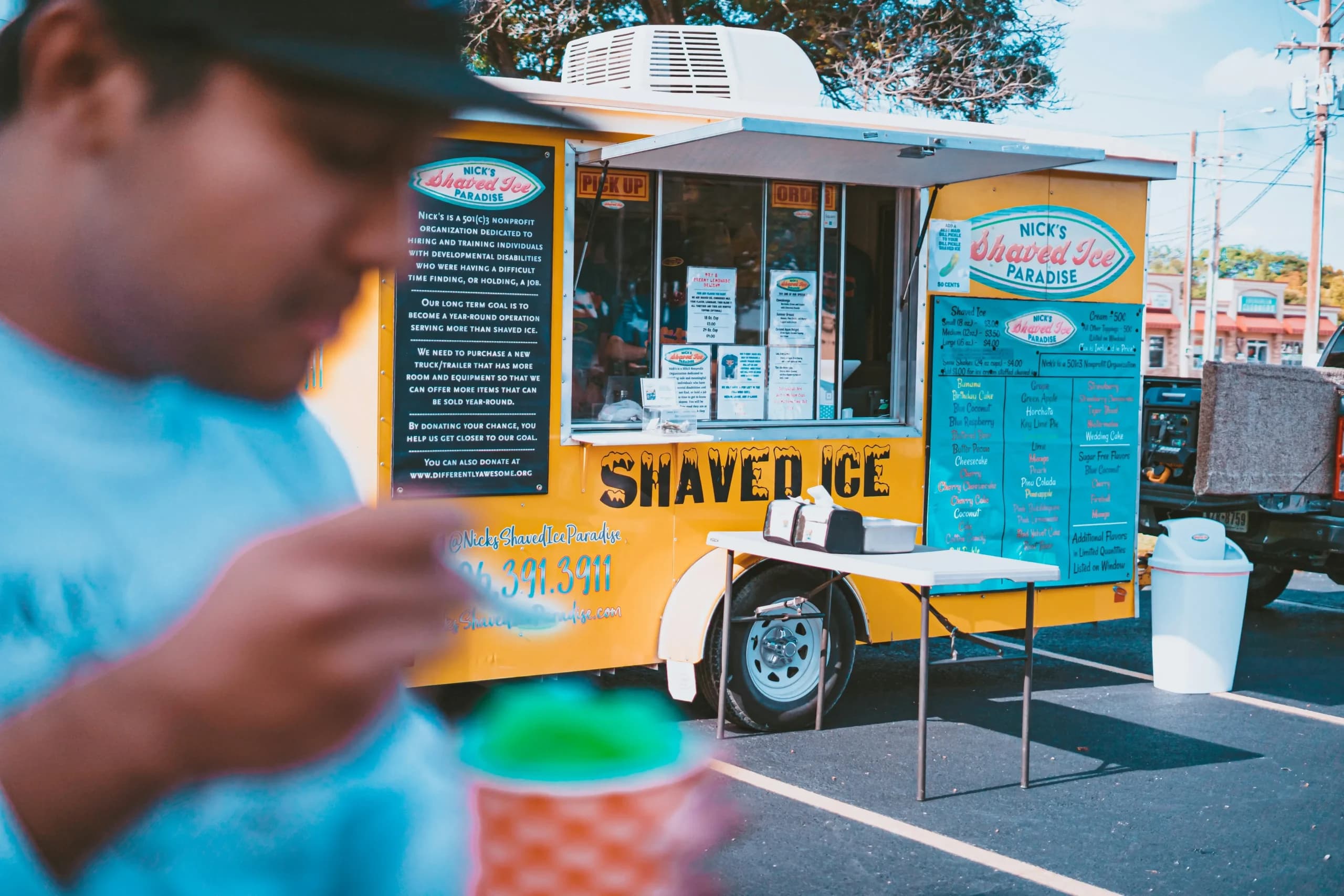Summary
Location: Tennessee, USA
Most cities and counties in Tennessee require food trucks to register locally as well as with the state. Owners must get the business license and mobile food facility permit from the local government. Statewide-accepted documents are the sales and use tax and fire permits.
Key requirements to remember:
- Sales and use tax permit is free to get
- Commissary agreement needed for mobile food facility permit
- Nashville operators must file metro health permit
- Tennessee doesn’t require a Certified Food Protection Manager
Opening a food truck in Tennessee entails licenses and permits from the state as well as the cities and counties you plan to operate in. You’ll need to register your business and get a sales permit so that you can charge tax. You’ll also need to get a mobile food facility permit and pass health and fire inspections to protect your team and customers.
1. Business license
If you’re planning to open a food truck in Tennessee, you’ll need a business license in each city or county where your food truck plans to serve. So if you’re based in Nashville but want to park in other cities like Chattanooga or Knoxville, you’ll need separate licenses for those areas, too.
The application process is handled through the Tennessee Department of Revenue, but some cities may also require you to register locally. Before you apply, choose your business type (LLC, sole proprietorship, etc.) and make sure you have an EIN (Employer Identification Number). You may also need to upload your business plan, proof of insurance (a COI), and pay a small business tax fee, depending on the location.
The cost of a business license in Tennessee varies, but most food truck owners can expect to pay between $15 and $100 per permit, per city. Some counties may also have renewal fees or require proof that you’re collecting sales tax correctly.
2. Sales and use tax permit
Every food truck in Tennessee needs a sales and use tax permit. This permit allows you to collect and report state and local sales taxes on the food and drinks you sell. If you’re serving up burgers, tacos, or coffee, you’re selling taxable goods, and this permit is what keeps your business legal and above board.
Without this permit, you’re not allowed to charge tax, and skipping it can cause big problems during tax season. You could face fines or lose your other permits, like your health permit or mobile food license. So while this isn’t the most exciting part of launching your truck, it’s one of the most important.
You can get the sales and use tax permit for free through the Tennessee Department of Revenue as well. The application is online and simple to complete. Even if your food truck operates in more than one city, you only need one permit, just make sure you report your total sales correctly based on your registered business address.
3. Mobile food facility permit
The mobile food facility permit is your official public health approval in Tennessee. Without it, it’s illegal to prep or serve any kind of food to customers.
Tennessee law requires you to submit a signed and notarized agreement with a commissary before you get this permit. You’ll also need to provide your food truck floor plan, menu, and layout of your truck’s equipment. The department should see a handwashing sink, a 3-compartment sink, and proper water and wastewater tanks (your greywater tank must be 15% larger).
The application process starts with your county health department. Submit your plans at least 15 days before starting construction or building out your truck. Once approved, you’ll schedule a pre-operational inspection to show your truck is set up properly and meets all health and safety standards.
At the state level, you can expect to pay about $210. Local fees range from $150 to $1,000, depending on your setup and the city you’re in.
Tennessee state fire permit
If your food truck uses propane, fryers, or grills, you’ll need a Tennessee state fire permit. With this statewide permit, you won’t have to file for local fire department inspections, which saves you time, money, and a lot of back-and-forth with different cities.
To get one, your food truck must pass an annual inspection by the State Fire Marshal. You’ll need to have a working fire suppression system if you cook with open flames or hot oil. You also need Class K and ABC fire extinguishers on board, and your hood system must be cleaned and serviced every 6 months.
Apply through the Tennessee State Fire Marshal’s Office. There’s a $300 fee, and you’ll need to schedule an on-site inspection of your unit.
4. Local mobile vendor permit
Check the additional permits and laws you need to follow to run your food truck in the city or county you want. For instance, you’ll need a metro health permit in Nashville, while you can’t hook up to water or power in Memphis. Otherwise, your food truck will be classified as a permanent restaurant.
In Chattanooga, you’re only allowed to park in approved zones for mobile food units. Metered spots must be reserved each day. Meanwhile, you must prove you have access to a restroom if you park in one spot in Lebanon for more than 3 hours.
5. Food handler’s license
Every team member who handles food needs a food handler’s license. It’s required by the Tennessee Department of Health and helps protect both your customers and your business.
You and your staff must complete an approved food handler course, like ServSafe, within 30 days of hire. These courses cover key topics like hygiene, temperature control, cross-contamination, and cleaning practices. It’s one of the fastest and most affordable ways to boost safety in your mobile food operation. It costs no more than $15 per employee.
Additionally, unlike some states, Tennessee doesn’t require a Certified Food Protection Manager (CFPM) to be on your food truck at all times. Instead, you must always have a Person-in-Charge (PIC), or someone who can show that they understand food safety practices and can answer questions during a health inspection.
Renewal timeline for all licenses and permits in Tennessee
Even before you start your food truck, the paperwork can pile up fast. If you’re not careful, you’ll miss crucial renewals. It’s important to have a checklist on hand to keep track of everything.
| Permit or requirement | Who issues it | Renewal timeline | Notes |
| Business license | Tennessee Department of Revenue + Local Counties | Annually | Required in each city or county you operate. Costs range $15–$100+. |
| Sales and use tax permit | Tennessee Department of Revenue | No renewal (update if needed) | One permit covers all cities. |
| Mobile food facility permit | County Health Department | Annually | Requires commissary agreement, truck layout, proper sinks, and pre-op inspection. |
| Tennessee state fire permit | Tennessee State Fire Marshal’s Office | Annually | Requires suppression system, Class K + ABC extinguishers, and hood service every 6 months. Fee: $300. |
| Local mobile vendor permit | Local City or County Governments | Annually or as set by location | Required to legally vend in specific cities. |
| Food handler’s license | Tennessee Department of Health or Accredited Course | Every 2 years | Required for all food-handling staff. |
The recipe for food truck success
Securing your business license, sales permit, health approval, and other required documents keeps you in good standing with the law and builds trust with your customers. Being a licensed business is the first step in your growth strategy. Once your foundation is solid, you can scale, explore new cities, and even expand into catering or brick-and-mortar opportunities.
Licensing gets your truck on the road, but your team keeps it moving. Supporting them with the right tools is key. 7shifts is an all-in-one restaurant management app with scheduling, time tracking, and communication features. It lets you and your team cut down on admin tasks to focus on serving delicious food to Tennessee customers.

Rebecca Hebert, Sales Development Representative
Rebecca Hebert
Sales Development Representative
Rebecca Hebert is a former restaurant industry professional with nearly 20 years of hands-on experience leading teams in fast-paced hospitality environments. Rebecca brings that firsthand knowledge to the tech side of the industry, helping restaurants streamline their operations with purpose-built workforce management solutions. As an active contributor to expansion efforts, she’s passionate about empowering restaurateurs with tools that genuinely support their day-to-day operations.
